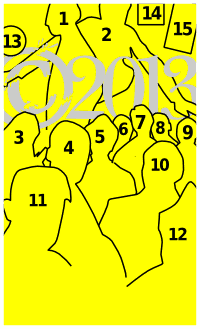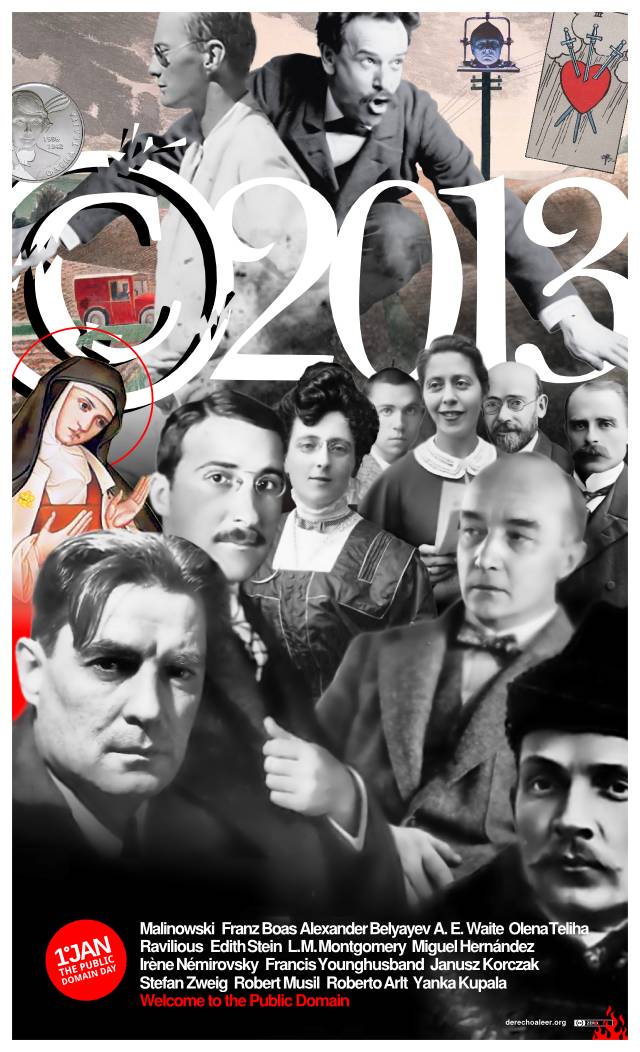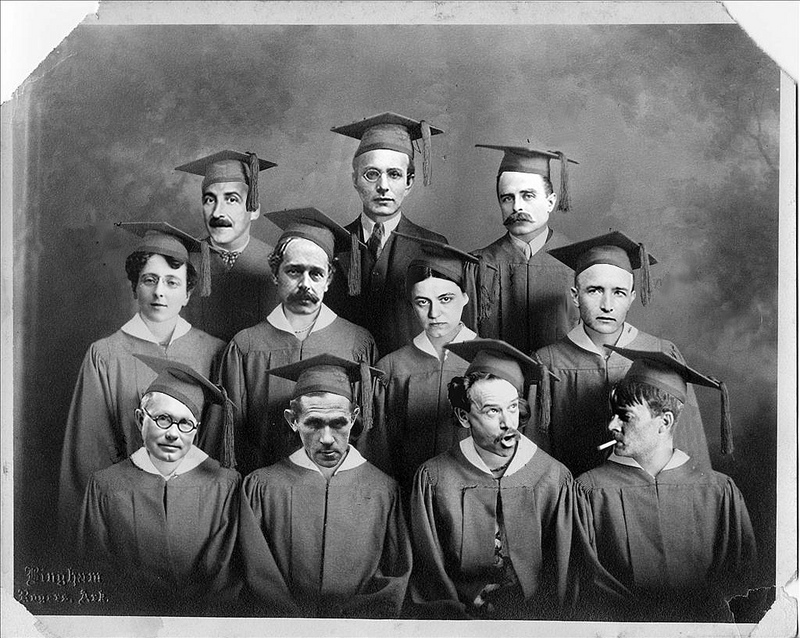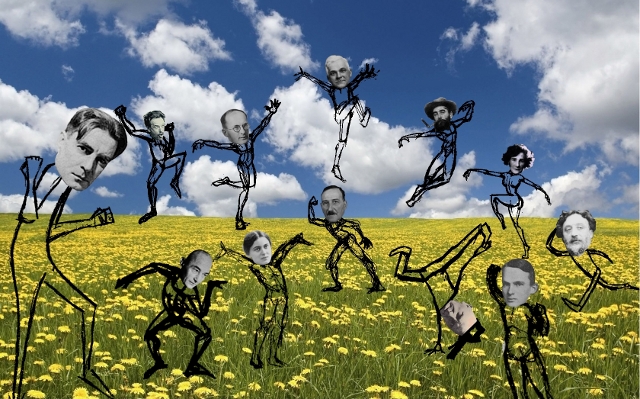Public Domain Day 2013
Happy Public Domain Day 2013!
We could say that the Second World War has been one of the most disinterested and effective benefactors in the list of authorial inclusions to the universal domain for this year 2013. The work of the authors that died in 1942 has joined in public domain on January 1st. 1942 was a prolific year of slaughters and brutality with more than ten million slaughtered people (performance superseded only in 1945, by the end of the war). 1942 was a decisive year: powers from the axis were closer to win. They started operating the Nazis extermination camps as well, with a practical, verbose and organized industry of systematic and massive murders. There, Jewish, Gypsies, “State enemies” and, of course, intellectual authors unpleasant or “corrupted” artists for the regime found death before their time and were condemned without finishing their best pieces. It is unusual —within Public Domain— to find authors whose splendor was in recent decades such as the 30s or the 40s. More than a century is the general average for their work to be released from artificial limitation of their diffusion. During last century, this system of enrich authors on a massive scale and make them millionaire —known as copyright— has not done anything but reach out its periods progressively until the everlasting 70 years after death. Unfortunately, the authors have a bad habit of living long after writing their remarkable work, delaying this way the liberating counting —but the lot of benefits gained in this post-mortem interval, destined to the noble and well known encouragement to the creation, continue, as we all know, stimulating the dead to produce new and original pieces from beyond life—.
When entering Public Domain is restricted by long and non rational intervals, the result cannot be another but oblivion. Not for the authors that have entered the selected group of famous and timeless that keep demand and therefore the interest in business but for the ones who are out of the market. It does not matter whether they were popular in their time, the legal uncertainty, the nature of a system based on flaw restriction, the permission culture, the meanness of their heirs or the lack of exceptions, it limits the necessary –and many times irreverent- reappropriation, that the following generation of authors and readers –with the contexts and references still alive- is always willing to do. One more photo or paragraph, one derivative work, music, translation, film script, without the scrupulous and pertinent permission means a risk that is hart to assume –especially when there are no great business- that contributes to the vicious circle of oblivion: permissions are difficult to obtain because the owners of the rights simply lose their interest to be found or because they impose excessive barriers. The marginal and specialized circuits, chest where diversity multiplies and where forgotten authors from the past have more chances of being around, they run out of incitement or promotion and get legal threats. This way, most of the work is condemned to wander (without parents) through the shelves of the libraries: these pieces are known as orphans works and they are legion.
If the periods were at *least reasonable as they were at the beginning, we could be reviewing writers whose work had been published two or three decades ago. But revive forgotten names after a century is a harder task. However, we do not give up to the attempt: modern anthropologists, the author of one of the most influential novels of the 20th Century, one famous Belarusian writer, a Jewish saint, the Russian “Jules Verne”, the author of the Tarot Cards, or various writers and intellectuals that found death during the war… it looks like there were no stunning names this year except for us: because of Roberto Arlt, who had something to say about Europe, the war and the uselessness of books…
[…] in Germany, around 10 thousand books are published yearly, which cover all the genres of the literary speculation. In Paris, the same happens. Idem in London. The same in New York.
Think this:
If each book had a truth, one only new truth in the surface of Earth, the moral civilization degree that men would have reached would be incalculable. ¿Wouldn’t be it? Now, think that men from those educated nations (Germany, England, and France) are arguing about the reduction of armament (and do not confuse it with elimination). Well, be prudent for a moment. Why is that ten thousand books per nation culture, annually over the heads of those lands’ inhabitants, worth? Why is that culture worth when by the year 1930, after a 1914 disastrous war, a problem that must have caused horror is discussed?
What are books for? Can you tell me? I - frankly speaking- declare that I ignore what books are for. […]
Copy and paste this etching (Roberto Arlt’s Aguafuerte) in your blog or site was a crime without the written permission of the rights owners. It is free now. Let’s celebrate!
 1. Bronislaw Malinowski
1. Bronislaw Malinowski
2. Franz Boas
3. Edith Stein
4. Stefan Zweig
5. Lucy Maud Montgomery
6. Miguel Hernández
7. Irène Némirovsky
8. Janusz Korczak
9. Francis Younghusband
10. Roberto Arlt
11. Robert Musil
12. Yanka Kupala
13. Olena Teliha
14. Alexander Beliaev
15. Arthur E. Waite
16. Eric Ravilious
Resources
- Sitio Public Domain Day
- “Breve guía hacia el dominio público en Argentina”, por Beatriz Busaniche.
- People Entering the Public Domain in 2013
- “Public Domain Call for Arts”, Amelia Andersdotter’s blog (Amelia is Swedish politician and Member of the European Parliament, elected on the Piratpartiet list in the 2009 election).
- “Died in 1942”, en NNDB
- “Died in 1942” en Wolfram Alpha
- “Authors who died in 1942”, en evi.com
- Mapa de la duración del copyright en cada país
- Más recursos sobre el dominio público
Class of 2013 in Public Domain Review
Public Domain 2013, sursiendo.com
Spanish to english translation: Bibiana Ruiz. Thank you!!


